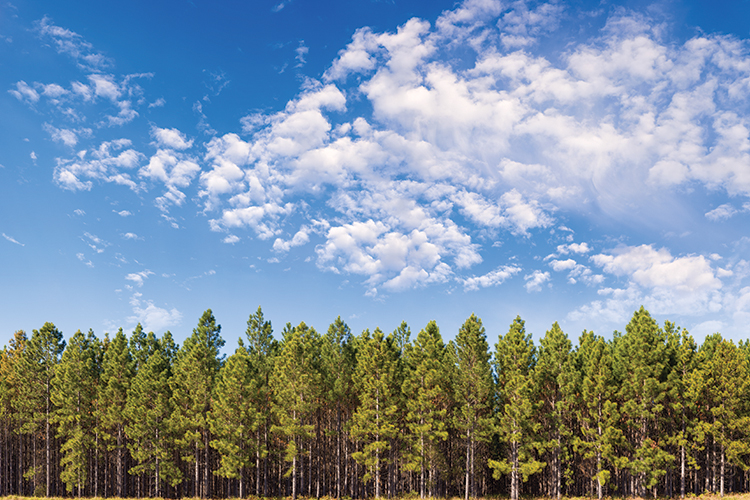Home > Georgia > Georgia Crops & Livestock > Georgia Forestry Industry is Seeing the Wood for the Trees
Georgia Forestry Industry is Seeing the Wood for the Trees
 Georgia’s forestry industry oversees the wood for the trees when it comes to the sustainability of the state’s forests – all 24.7 million acres of it. Not only that, but 24.4 million acres this land, which is home to approximately 250 tree species, is potentially available for timber production – making Georgia one of the most important forestry sectors in the U.S.
Georgia’s forestry industry oversees the wood for the trees when it comes to the sustainability of the state’s forests – all 24.7 million acres of it. Not only that, but 24.4 million acres this land, which is home to approximately 250 tree species, is potentially available for timber production – making Georgia one of the most important forestry sectors in the U.S.
Jody Strickland is vice president of business development for F&W Forestry Services, a privately owned company in Albany that has over 50 years of experience managing forests for clients. Strickland says the focus of the forest industry today is a joint endeavor where sustainability meets productivity.
But, she adds, sustainability isn’t a new trend for foresters.
“It has become vogue to be considered a ‘green’ industry, but foresters were the original environmentalists,” Strickland says. “It is our livelihood, so we have every reason to take good care of the land and to ensure it is managed in a way that will be beneficial to the growing population for generations to come.”
![GA forestry [INFOGRAPHIC]](https://eadn-wc01-4177395.nxedge.io/wp-content/uploads/2020/05/Screen-Shot-2016-09-27-at-3.56.59-PM.jpg) Renewable Resource
Renewable Resource
The difference now, as opposed to 25 years ago, is the general public cares more about the footprint of the products it uses, from food to furniture to paper products. Likewise, forestry has become more environmentally conscious than ever. Combine that with the ability to grow more volume per acre per year, and you have a gangbuster crop that is nowhere near going extinct.
“Forest products are a renewable resource that should be utilized,” Strickland says, “which in turn encourages people to plant more forests.”
F&W Forestry operates throughout the U.S., Europe and South America, and provides a common thread between foresters, landowners and investors. The company works to make timberland ownership easy to understand, enlisting skilled experts to focus on clients’ needs, from fieldwork to financials.
Strickland is one of those experts. While her resume does not boast a forestry degree, she considers herself “a forester in every way.” Strickland grew up in Perry on her family farm, which raised cattle, row crops and timber. She majored in agricultural engineering at the University of Georgia, and earned a master’s in engineering from the University of Florida before going to work for Proctor & Gamble as an engineer for a pulp mill in 1988. There, she immersed herself in the business.
“I like to understand all aspects of whatever business I am in, so I worked my way from the finishing end of the pulp mill, where I started, to the wood yard and then all the way back to the timberland where the trees were grown to supply the mill,” Strickland says.
She adds, “When Weyerhaeuser bought the mill and Georgia timberland, I began learning everything I could about how to grow trees from their research and development group and many cooperatives, including UGA and their forestry continuing-education courses. As a result, I became the region timberlands manager for Weyerhaeuser and led the Southwide Silviculture Improvement Team.”
![GA forestry [INFOGRAPHIC]](https://eadn-wc01-4177395.nxedge.io/wp-content/uploads/2020/05/Screen-Shot-2016-09-27-at-3.57.15-PM.jpg) Today, Strickland has over 28 years of experience in forestry and has been with F&W Forestry since 2014. Among other notables, she is a member of the board of directors for Superior Pine Products, Superior Berries and Jones Creek Honey. “I really enjoy my work there because I get to be involved in forest management, blueberry farming and honey production,” she says.
Today, Strickland has over 28 years of experience in forestry and has been with F&W Forestry since 2014. Among other notables, she is a member of the board of directors for Superior Pine Products, Superior Berries and Jones Creek Honey. “I really enjoy my work there because I get to be involved in forest management, blueberry farming and honey production,” she says.
When it comes to Georgia’s forestry industry, Superior Pine Products Company is not to be overlooked. The Fargo-based, privately held company is a market leader that is unique in many ways, including its history of diversification.
Superior Pine manages natural resources for stockholders and has been balancing the needs of its clients with the needs of the land since the 1920s. The idea of sustainable forestry management is nothing new for the company, which got its start producing rosin and turpentine before transitioning in 1948 to timber production. The company’s management practices maximize timber production and sustainability, and the company owns the Suwannee Forest. Superior Pine proudly works to ensure the forest’s sustainability.
In 2003, Superior Pine Products formed the wholly owned subsidiary Superior Berries Company after deciding blueberries were an alternate crop that would complement its forest operation and allow the company to diversify yet again.
For Superior Pine, sustainability is a fact of life. Perhaps the email signature of Superior Pine President Andy Stone says it best. Each electronic message ends with this statement in bold, green print: “It is OK to print this electronic message. Paper is a plentiful, biodegradable, renewable, recyclable, sustainable product made from trees that provide jobs and income for millions of Americans. Thanks to improved forest management, we have more trees in America today than we had 100 years ago.”



